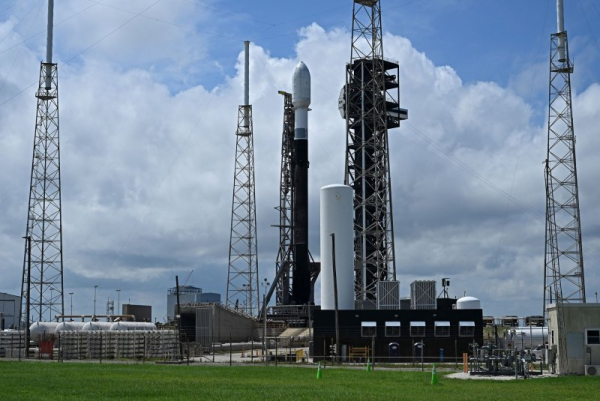Weather a concern as SpaceX plans launch to deliver European navigation satellites

A SpaceX Falcon 9 rocket is prepared to launch two Galileo satellites for the European Commission from Launch Complex 40 at the Cape Canaveral Space Force Station, Florida on Tuesday. Galileo’s network of satellites will provide navigation data similar to the U.S. GPS system. Photo by Joe Marino/UPI | License Photo
SpaceX is watching the weather ahead of Tuesday’s Falcon 9 launch of the European Commission’s Galileo L13 mission, which will carry its navigation satellite constellation to medium Earth orbit.
The mission to deliver two Galileo satellites is scheduled to launch at 6:50 p.m. ET from Space Launch Complex 40 at Cape Canaveral Space Force Station in Florida. A live webcast of the launch is set to begin about 15 minutes earlier. Advertisement
“Propellant load is underway for today’s Falcon 9 launch of the Galileo L13 mission from pad 40 in Florida. Weather is currently 60% favorable for liftoff,” SpaceX wrote in an updated post less than an hour before launch.
Propellant load is underway for today’s Falcon 9 launch of the Galileo L13 mission from pad 40 in Florida. Weather is currently 60% favorable for liftoff pic.twitter.com/R2Pv4Rnb2f— SpaceX (@SpaceX) September 17, 2024
“Falcon 9 is ready to safely deliver Galileo L13 to orbit and return to the drone ship in the Atlantic Ocean,” SpaceX added.
Tuesday’s launch would mark the second time that Galileo satellites launched from the United States. In April, the L12 mission flew on another Falcon 9 rocket. Advertisement
“During the Galileo L12 mission earlier this year, the Falcon 9 booster was expended to provide the additional performance needed to deliver the payload to its orbit,” SpaceX wrote on its website.
“Data from that mission informed subtle design and operational changes, including mass reductions and trajectory adjustments, that will allow us to safely recover and reuse this booster.”
Earlier Tuesday, the launch faced a 40% chance of favorable weather at liftoff, as the 45th Weather Squadron forecast called the recovery weather risk as “moderate.”
“Several factors are in play for the weather this week. Primarily an area of low pressure spinning off the southeast U.S. coastline will gradually move onshore near South Carolina by Tuesday afternoon,” meteorologists wrote.
“This circulation pattern, along with several waves of upper-level vorticity will help generate convergent bands of clouds and associated showers rotating through most of Florida into Tuesday,” they added.
If Galileo fails to launch Tuesday, a liftoff window Wednesday at 6:46 p.m. ET would become available.
